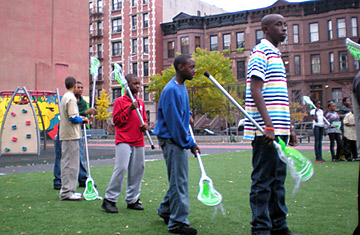
At New York City's Future Leaders Institute in Harlem, students, who previously hadn't even seen a Lacrosse stick, are learning the game.
"If we're integrated, then why aren't there any white kids here?" That's what seven-year-old Jahseem Maxwell wanted to know, when his second-grade teacher, Lindsay Korn read to the class from Toni Morrison's Remember (which includes a brief history of integration). Despite the historic U.S. election occurring on the same day he asked his question, the world outside his classroom at the Future Leaders Institute just off Harlem's Malcolm X Boulevard didn't seem much different from the 1950s reality described by Morrison.
Peter Anderson, the school's director, has made the same observation. The townhouses on the blocks alongside the school sell for up to $3.5 million, but he knows the children in those homes won't be coming to his school, where 96 percent of the students are black, and more than 70 percent qualify for reduced or free lunch programs. According to Anderson, some of the students live in homeless shelters, and about half are raised in the projects, mostly by single parents.
It should come as no surprise, then, that the 24 children in Korn's class had never seen a lacrosse stick before she introduced one. The predominantly white sport popular at Northeastern and Mid-Atlantic universities requires two things New York City public schools don't have: money and fields. But given the election, it was, after all, a week of firsts. "All of our students were excited about the election," said Anderson. "For us educators, Obama's victory means that when we tell these students that they can do anything, it's not hyperbole." And so, on an unseasonably warm Friday afternoon, 35 middle-school students showed up to learn how to play lacrosse.
Nevermind that they'd never seen a lacrosse game, much less played in one; Anderson believes in giving students a lacrosse stick and the chance to play their way to a better education. "Ideally, I want to see about 60 percent of the kids who started with us at go on to boarding schools or private schools," says Anderson. Enter Korn's father, Rick, a former player who helped coach his own son to the Division-I level; Bob Turco, a Harlem-born lacrosse coaching legend who played his way to Washington and Lee University in the '70s; and Ross Turco, Bob's son and former high school All-America and D-I player who now coaches at Peddie, an elite boarding school in Hightstown, New Jersey. The well-connected trio, along with the school's director of advancement, Michael Pages, have volunteered to hold practices twice a week, using donated equipment.
"This is about your will," Bob Turco said to rookie players as they gathered around him on the school's small turf playground. "Your will to accomplish something you don't understand and just say, 'I'm going to prove I can do this.' " With the backdrop of classic Harlem brownstones behind them, the students split into lines and learned basic skills, such as passing and scooping the ball, while Turco called out instructions. "I never see them listen to anyone like this," said Anderson from the sidelines. "This is really something."
As the school director's vision unfolded in front of him, the line between the impossible and the inevitable seemed to fade for the second time in a week. Many of the students had come to school Wednesday after going to the voting booths with their parents, while others had stayed out late to listen to Obama's victory speech broadcast over loudspeakers near 125th Street. That same day they wrote letters to the president-elect. "I want to change things, too", wrote Fortune Nbumbo, 7. Tatiana Jones, 9, told Obama, "You open the door not just for me, but for everybody." For the students at FLI, the definition of leadership is clearer than it's ever been, and the playing field, even if it's a patch of turf between two brick walls, is slowly leveling out.
